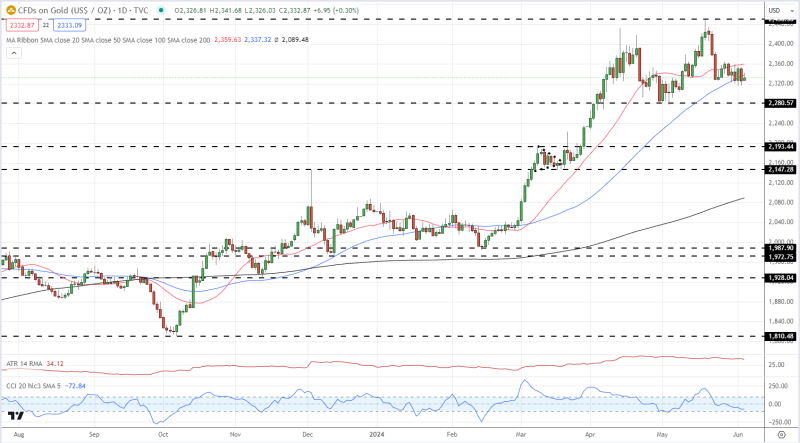05 Jun, 2024
Gold (XAU/USD) Analysis and Chart
- CCI indicator is at its lowest level since early May.
- Weaker US Treasury yields should underpin the precious metal.
- US ISM and the latest US Jobs Report will drive the next move.
Gold is slightly better bid in mid-morning trade, aiming to establish a near-term base just below the $2,320 per ounce level. This resilience is partially attributed to the recent decline in US Treasury yields. After peaking at 5% by the end of May, the yield on the rate-sensitive 2-year Treasury note has retreated to 4.80%. A break below the supportive 200-day simple moving average at 4.75% could leave the multi-week low of 4.70%, made on May 16, vulnerable.
The recent series of higher highs in Treasury yields have been disrupted, signaling a potential end to this year’s yield rally. The Commodity Channel Index (CCI) indicator suggests that the market is currently oversold, indicating a likely short-term period of consolidation before the highly anticipated US Jobs Report (Non-Farm Payrolls) scheduled for this Friday (13:30 UK).
UST 2-Year Yield Chart

Surprisingly, gold has exhibited resilience in recent days, failing to benefit from the weak US economic data and growing expectations of Federal Reserve rate cuts. In this context, market participants eagerly await the release of the latest ISM services data later today, which will be closely scrutinized. Forecasts suggest the May services figure will come in at 50.5, compared to 49.4 in April. Any downside miss in this crucial economic indicator could provide the catalyst for gold to push higher. However, the highly anticipated Non-Farm Payrolls ( NFP ) report, scheduled for Friday, will ultimately decide the precious metal’s short-term trajectory heading into the weekend.
The daily chart reveals gold consolidating within the $2,320 to $2,330 per ounce range ahead of the ISM data release. Significantly, the Commodity Channel Index (CCI) indicator shows gold at a multi-week oversold level, while the precious metal is currently trading below both the 20- and 50-day simple moving averages. Should a further move lower materialize, support is expected to be found at the $2,280 per ounce level. In the short term, gold’s performance remains heavily data-dependent, with market participants closely monitoring economic releases and their potential impact on the Federal Reserve’s monetary policy stance.
For all market-moving economic data and events, see the Dreamboot Wealth Institute
Gold Daily Price Chart

Chart via TradingView
Retail trader data shows 61.47% of traders are net-long with the ratio of traders long to short at 1.60 to 1.The number of traders net-long is 6.53% higher than yesterday and 5.93% lower than last week, while the number of traders net-short is 12.80% lower than yesterday and 4.17% lower than last week.
We typically take a contrarian view to crowd sentiment, and the fact traders are net-long suggests Gold prices may continue to fall. Positioning is more net-long than yesterday but less net-long from last week. The combination of current sentiment and recent changes gives us a further mixed Gold trading bias.
| Change in | Longs | Shorts | OI |
| Daily | 8% | -17% | -2% |
| Weekly | 1% | -14% | -4% |
